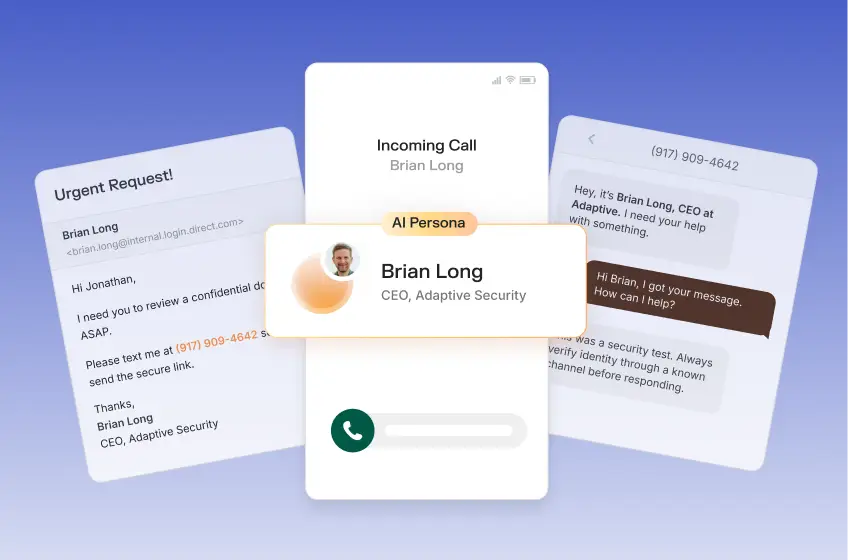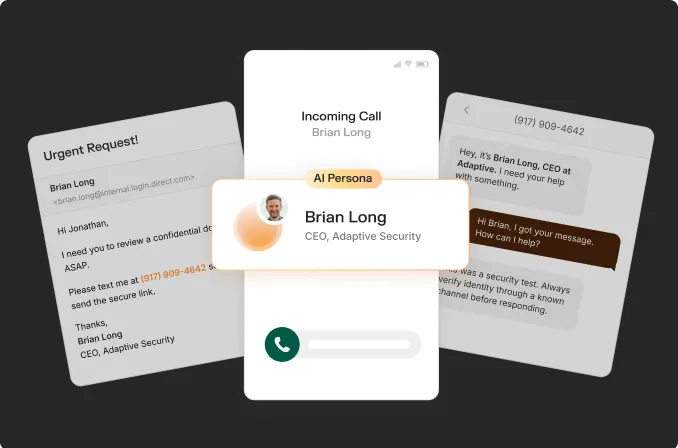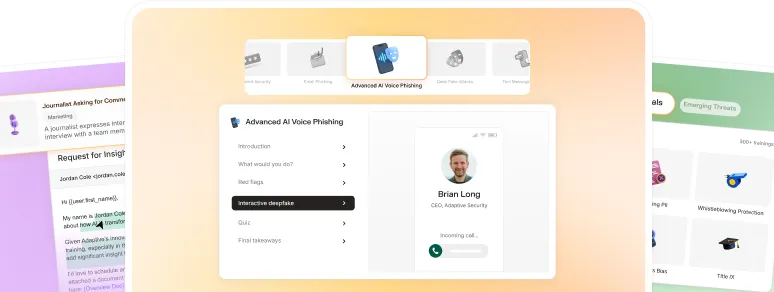Phishing remains the entry point for more than 60% of all data breaches, utilizing AI-generated deepfakes, cloned voices, smishing, quishing (QR-code phishing), and behavior-targeted social engineering. With AI‑driven campaigns surging over 1,200% since the rise of generative models, human risk is your most urgent vulnerability.
IT security leaders need to shift from vendor awareness to measurable, behavior-based risk reduction. That starts with choosing phishing simulation software that integrates AI awareness, human risk insights, and effective training.
Here are the phishing simulation vendors we'll compare:
- Adaptive Security
- KnowBe4
- Proofpoint
- Cofense PhishMe
- Infosec IQ
- Hoxhunt
- Gophish
- MetaCompliance
The top 8 phishing simulation tools for 2026 and beyond
Phishing simulation platforms vary widely in scope, features, and cost. This overview outlines eight leading options in 2026, with details on their features, pricing models, and common use cases.
1. Adaptive Security
Adaptive Security is a next-generation phishing simulation and security-awareness platform that recreates modern attacks across email, SMS, voice, and deepfake video. Its differentiator is the use of open-source intelligence (OSINT) to build personalized campaigns, such as deepfake calls from executives or AI-generated spear-phishing emails. Customers like the Dallas Mavericks and Xenon Health praise its relevance and interactivity, noting that deepfake training drew them in and its up-to-date, real-world scenario training has been invaluable.
.png)
Pros
- Multi-channel coverage: email, SMS, voice, and video
- AI-powered deepfake and spear-phishing simulations
- Behavioral risk tracking and board-ready reporting
- Positive customer feedback on interactivity
Cons
- Frequent product updates, being a newer company
2. KnowBe4
KnowBe4 is one of the largest security-awareness vendors, offering a vast library of videos, games, quizzes, and an unlimited phishing-simulation console. It includes automated campaigns, AI-recommended training, and the PhishAlert reporting button.
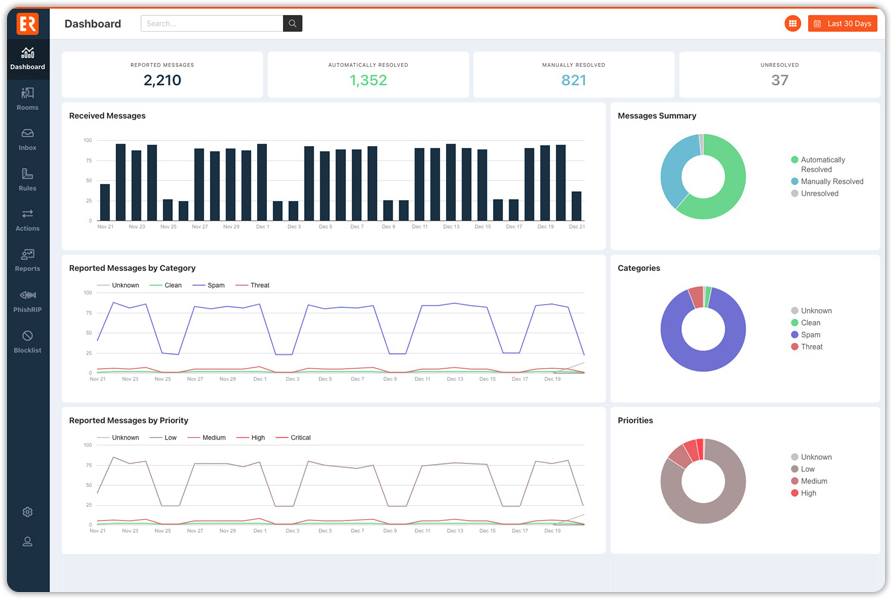
KnowBe4 suits organizations seeking a broad training library and an established vendor reputation. However, those seeking more customization options may want to look at KnowBe4 alternatives.
Limited customization optionsKnowBe4’s pricing varies, starting at $1.30 per user per month and climbing to $3.25 per user per month, based on the plan and number of seats.
Pros
- Extensive training content library
- Unlimited phishing tests and automated campaigns
- Established vendor reputation
- AI-driven training recommendations
Cons
- Reports of outdated content, according to customers on G2
- High learning curve
3. Proofpoint
Proofpoint’s Assess platform combines phishing, smishing, and USB simulations with culture assessments. Its “People Risk Explorer” identifies very attacked people (VAPs) based on threat data, and employees who click can be auto-enrolled into adaptive learning paths.
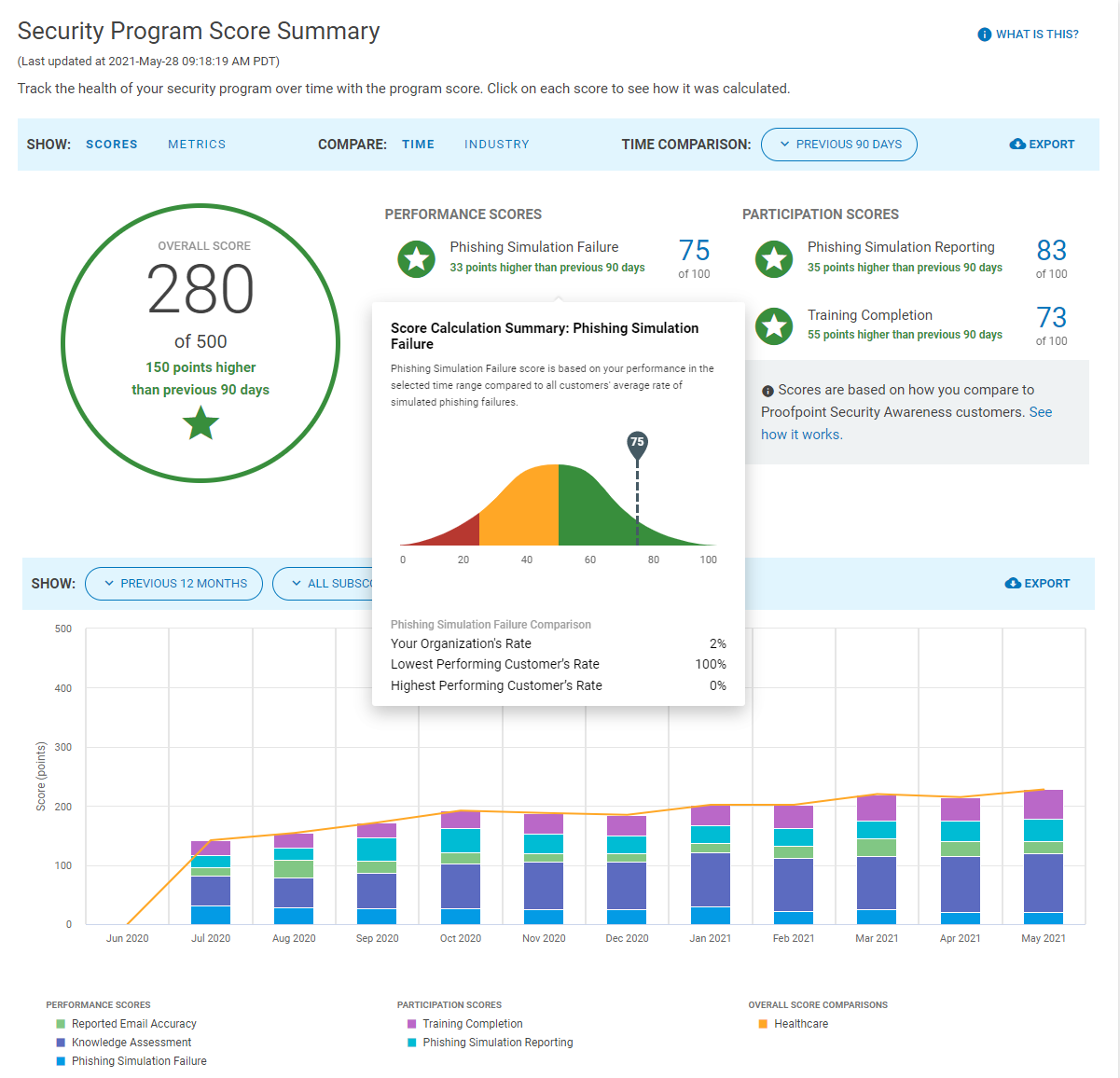
Proofpoint is ideal for enterprises that already use Proofpoint email security and need deep integration between training and threat detection. However, if you’re seeking a more cutting-edge, AI-driven platform, you may want to consider a Proofpoint alternative.
ConstantEdge offers Proofpoint SAT Standard for $18 per year per user with unlimited access to ThreatSim® Phishing Simulations.
Pros
- Wide range of phishing types (email, smishing, and USB)
- People Risk Explorer with real-world threat data
- Thousands of templates across 42 languages
- Strong integration with email threat intelligence
Cons
- Limited customization options
- Content can feel generic, notes some G2 users
4. Cofense PhishMe
Cofense PhishMe delivers customizable phishing campaigns with scenario-based training that mirrors real attacks. It integrates with Cofense Reporter, Triage, and Vision, giving security teams a combination of training and automated mitigation.
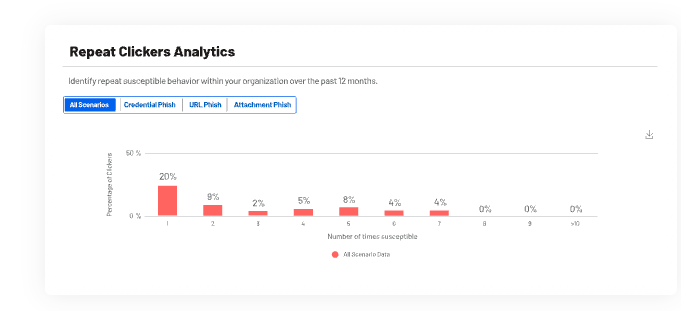
Pros
- Fully customizable phishing campaigns
- Scenario-based training grounded in real attacks
- Integrates with Cofense Reporter, Triage, and Vision
- Balance of human training and machine automation
Cons
- High price point (no public pricing)
- Limited advanced features compared to competitors, as noted in Gartner reviews
5. Infosec IQ
Infosec IQ offers a 12-month training program with adaptive phishing simulations, role-based learning paths, and immediate feedback. Administrators can customize campaigns with IQPhishSim and use PhishNotify for user-reported emails.
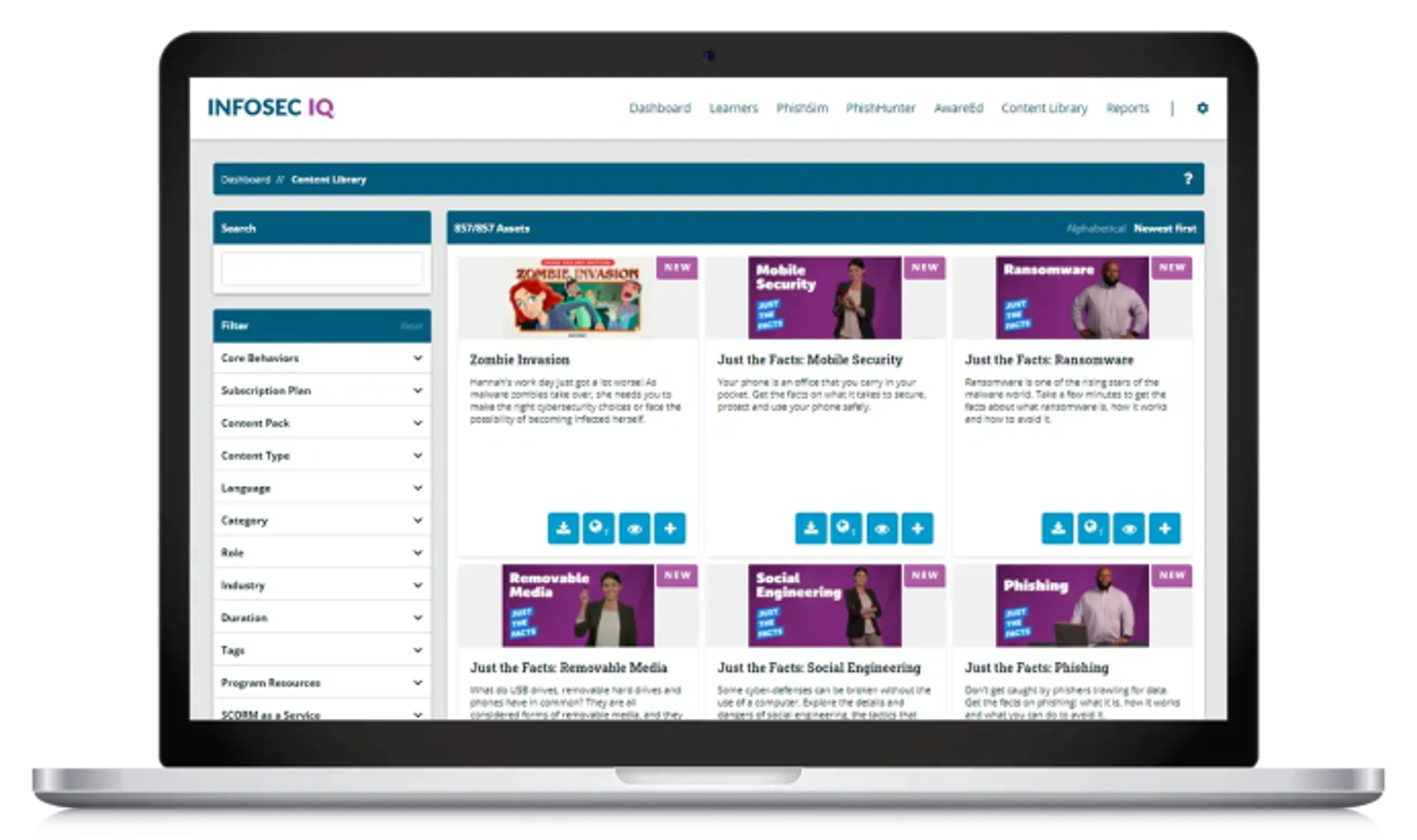
Pros
- Role-based training and adaptive simulations
- Customizable campaigns via IQPhishSim
- Detailed progress tracking
- Immediate feedback for employees
Cons
- Reported bugs and sluggish tools, according to TrustRadius
- Limited template variety
- Pricing not public (quote required)
6. Hoxhunt
Hoxhunt emphasizes behavior change with AI-driven, personalized phishing simulations and gamified experiences. Difficulty adjusts to each user’s skill level, with real-time feedback and leaderboards to encourage engagement.
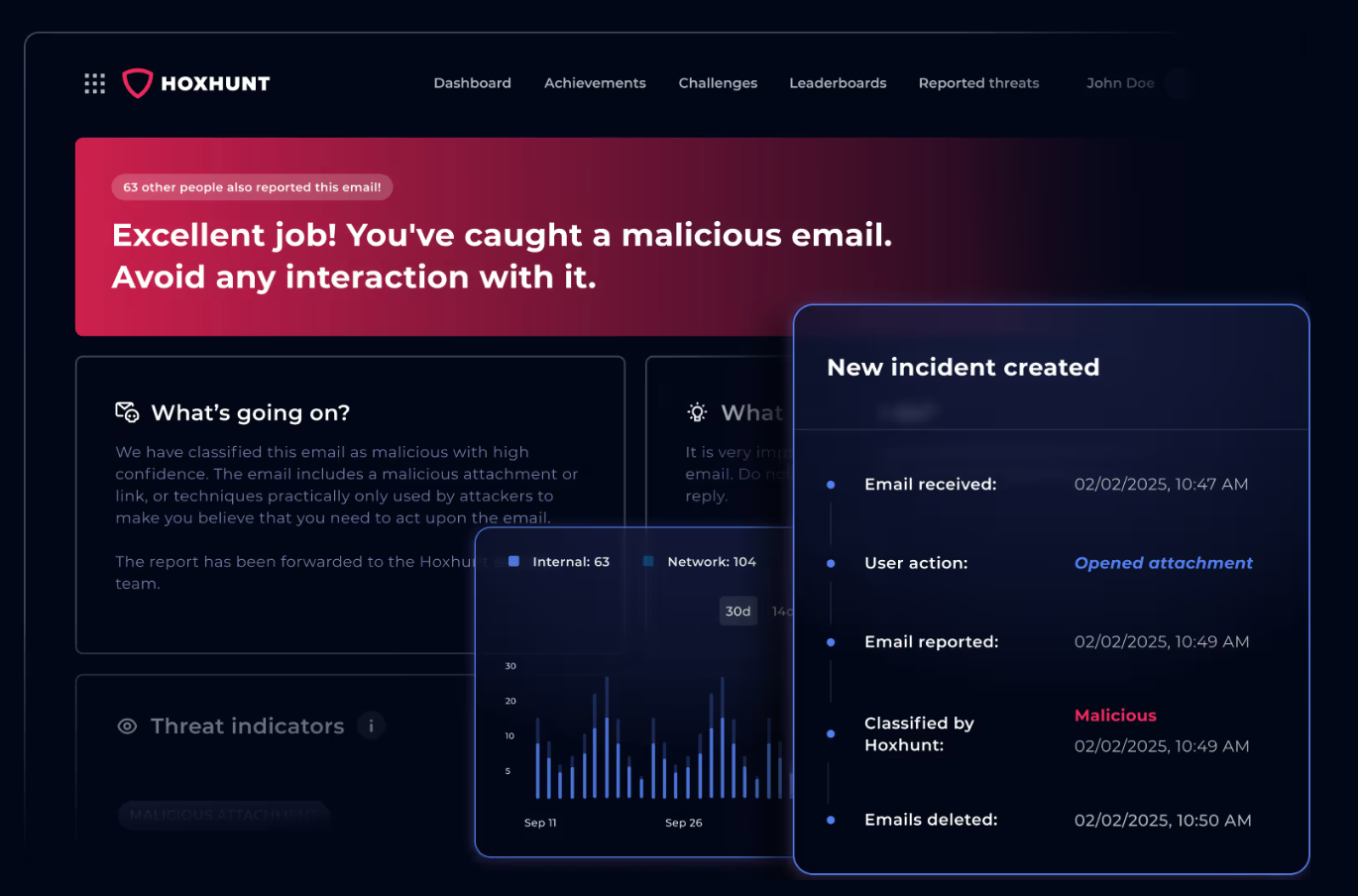
Hoxhunt leads with an engaging, adaptive approach, making it great for large businesses looking for scalable, gamified training. However, Adaptive’s competitor analysis notes that the need for comprehensive phishing testing software has never been greater due to the rise of AI-generated threats.
Pros
- Personalized phishing simulations
- Gamification with achievements and leaderboards
- Real-time feedback for employees
- Supports 30+ languages
Cons
- Limited to email phishing (no video, SMS, or voice)
- Setup can be time-consuming
- Simulations may feel repetitive
- Pricing not public (quote required)
7. Gophish
Gophish is an open-source phishing framework that lets teams run tailored campaigns at no cost. It’s simple to install and includes a REST API, cross-platform support, and a web UI for building and tracking campaigns.
Its standout features include one‑click installation, a cross‑platform binary, a full REST API, and a simple web UI for building templates and tracking results in real time.
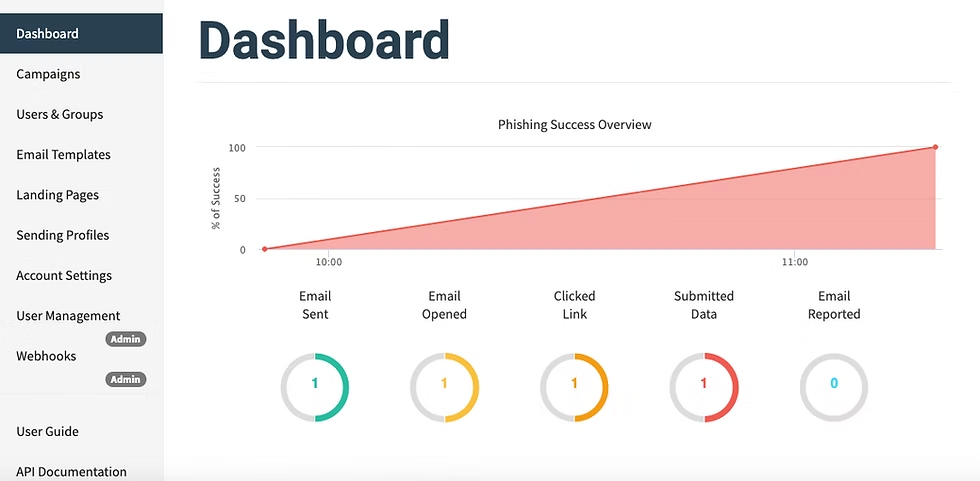
Gophish is a good option for security teams needing a flexible, no‑cost platform to run bespoke phishing tests. As an open-source platform, it’s also free to use.
Pros
- Free and open source
- Cross-platform with REST API
- Intuitive interface for template building
- Widely used by security professionals
Cons
- Lacks scheduling features
- No awareness-training content
- Limited sophistication compared to paid tools
8. MetaCompliance
MetaCompliance combines phishing simulations with compliance-focused security awareness training. Users value its customizable content, engaging modules, and intuitive admin controls. It’s designed for organizations with strong compliance requirements.
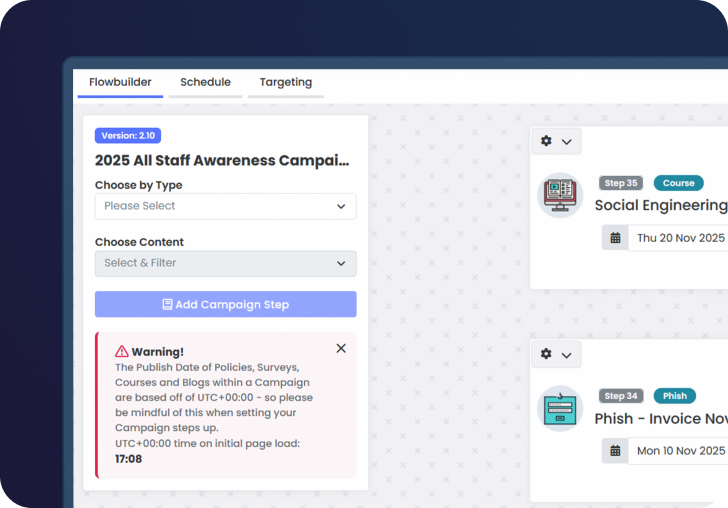
Pros
- Compliance-focused training platform
- Customizable and visually engaging content
- Easy to deploy with regulatory frameworks in mind
- Intuitive admin experience
Cons
- Limited reporting and integrations, as reported by customers
- Narrow phishing-scenario library
- Occasional technical issues
- Pricing not public (quote required)
Selection criteria: How to choose a phishing simulation tool
In evaluating phishing simulations for employees, it’s important to look beyond basic “gotcha” tests. The right platform should align with both your security objectives and your organization’s culture. Key criteria include:
- Coverage of modern threats: Ensure the platform replicates different types of phishing attacks. Beyond email, it should also cover AI-generated scams, deepfake voice or video, smishing, and vishing.
- Customizability: Training is more effective when it mirrors an employee’s real environment. Seek platforms that allow localized content, industry-specific templates, and department-focused simulations.
- Reporting and analytics: The right platform should include more than click rates. Look for detailed dashboards with behavioral risk scores, trend analysis, and reporting formats you can share at the board or audit level.
- User experience: Employees learn best in non-punitive environments. Tools that include immediate feedback, gamification, or adaptive difficulty encourage participation without creating resentment.
- Cost and scalability: Pricing should match your organization’s size and growth. Assess whether the platform demonstrates measurable ROI and has a concrete impact by tracking metrics on how training reduces risk exposure and improves employee resilience over time.
The breakdown: How do the 8 best phishing simulation tools stack up?
Choosing the right tool means balancing scope, cost, and the level of behavioral insight you need. Some providers focus on broad employee awareness with large content libraries, while others lean into AI to simulate real-world cyber attacks (i.e., deepfake calls or generative spear phishing).
Use this table as a quick reference to evaluate which platform aligns best with your training objectives.
Choosing the best phishing simulation training tool for your organization
Selecting a phishing simulation tool is about building a security awareness training program that prepares employees for real-life phishing threats. Modern tools must cover advanced tactics like deepfakes, smishing, and vishing, while still addressing common attacks such as Gmail phishing.
Adaptive Security stands out as the only platform designed from the ground up for AI-native threat simulation. Customers routinely tell us we win deals against KnowBe4 due to Adaptive’s real-world deepfake and voice phishing simulations, personalized insights, and board-ready reporting.
Ready to see Adaptive in action? Explore our AI-powered phishing simulation platform, built for modern threats like deepfakes and vishing. Book a demo today.
FAQs about phishing simulation tools
What is a phishing simulation tool?
A phishing simulation tool is a training platform that mimics common and emerging phishing tactics to measure how employees respond. By testing reactions in a safe environment, organizations can identify risky behaviors and improve awareness before attackers exploit them.
Are phishing simulations legal?
Yes. Phishing simulations are legal when conducted responsibly. Reputable providers ensure exercises comply with data-protection laws like GDPR, and organizations must notify employees that security testing may occur as part of their training program.
What’s the ROI of phishing simulation tools?
Strong ROI comes from reducing successful attacks. Simulations teach employees to resist hackers and can lower click-through rates on malicious links. Paired with a broader cybersecurity training program, they cut the likelihood of breaches and minimize downtime, fines, and incident response.
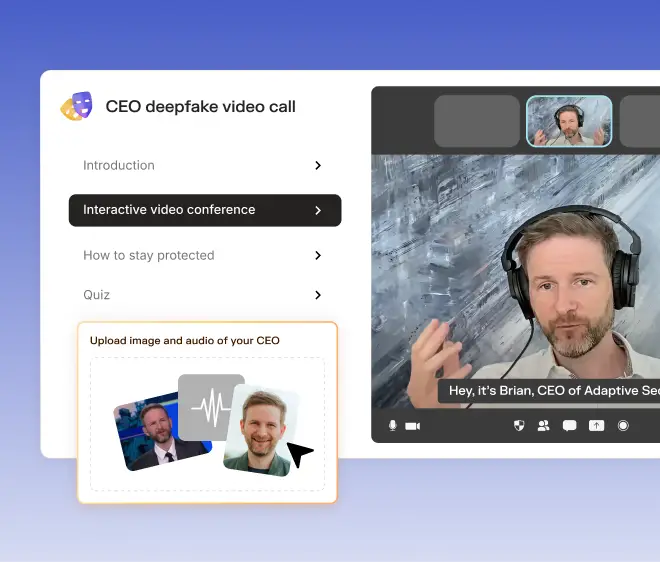



As experts in cybersecurity insights and AI threat analysis, the Adaptive Security Team is sharing its expertise with organizations.
Contents
